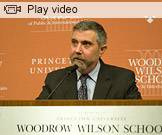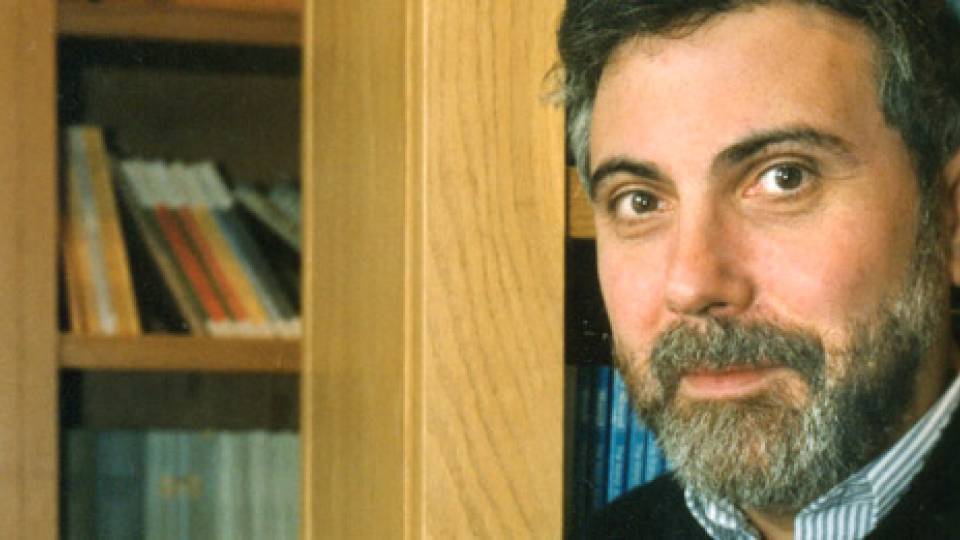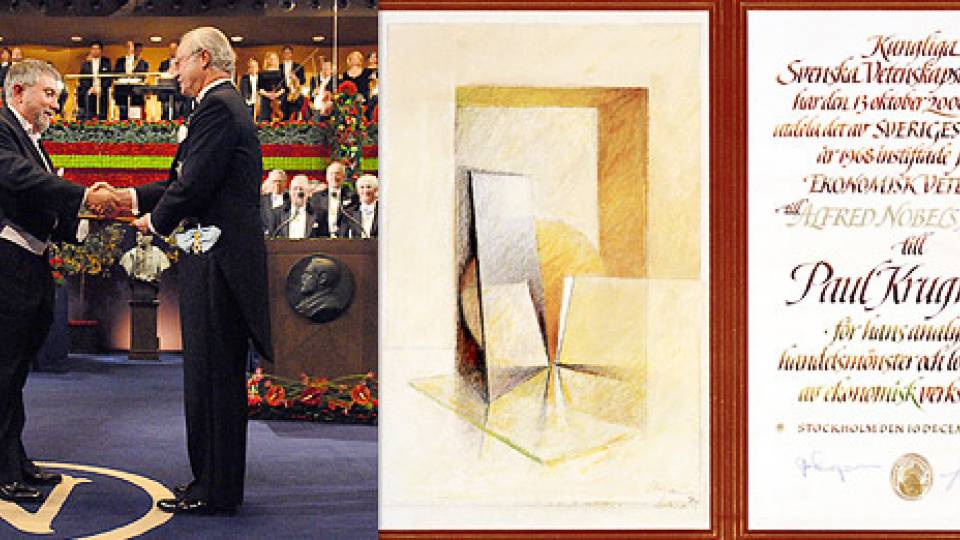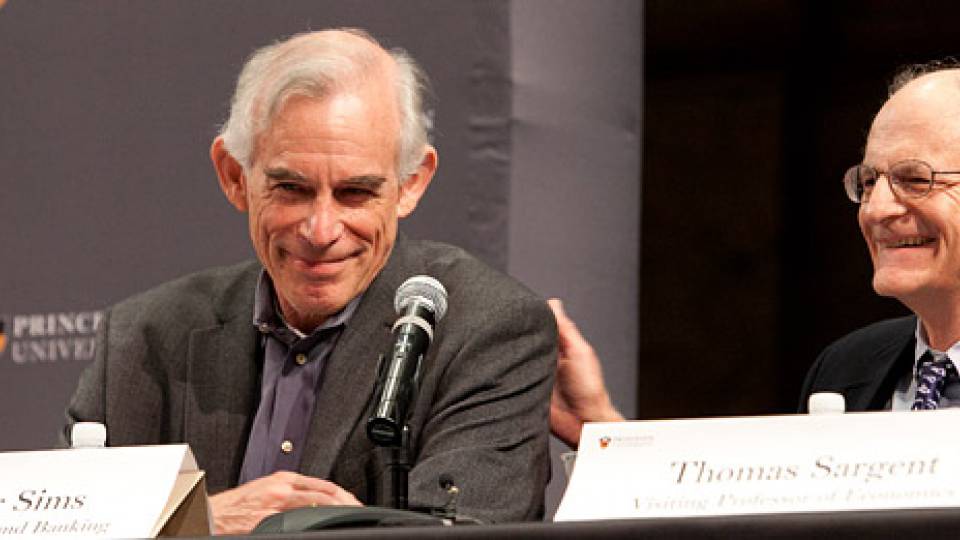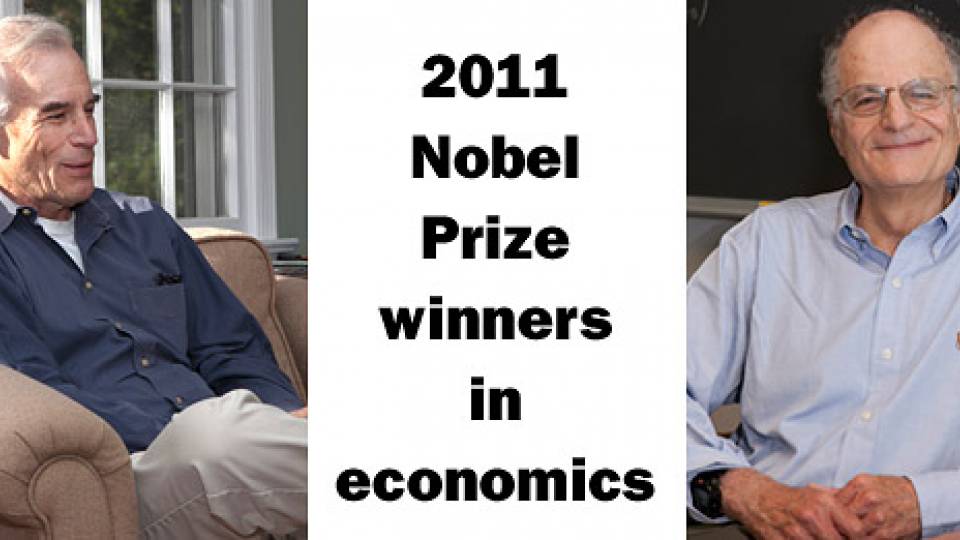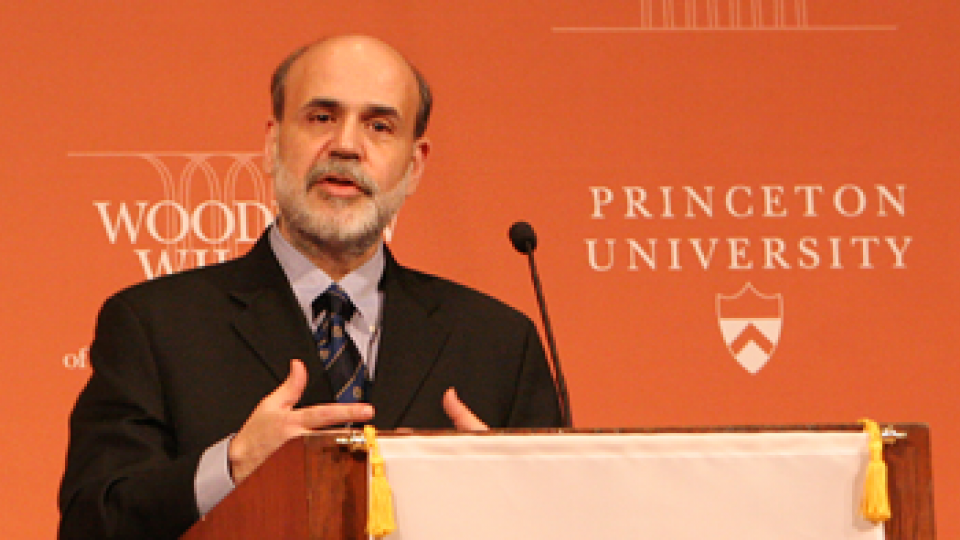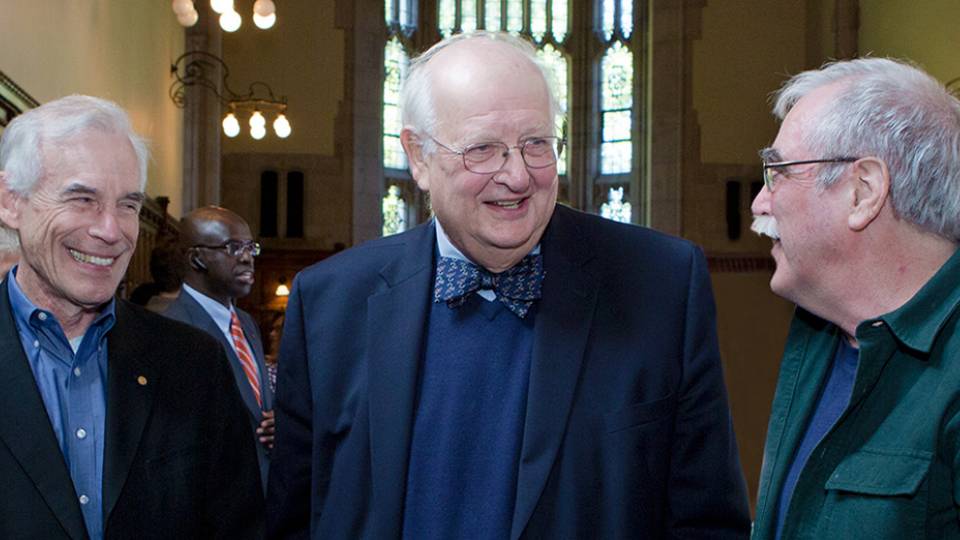Princeton economist Paul Krugman, acclaimed in his field for insights into international trade patterns that overturned longheld theories about the global economy before he rose to popular distinction as a media columnist and commentator, has been awarded the 2008 Nobel Prize in economics.
Krugman, a professor in the Department of Economics and in the Woodrow Wilson School of Public and International Affairs since 2000, was greeted with a standing ovation in a packed Dodds Auditorium in Robertson Hall, where Princeton faculty, students and administrators attended an international press conference in Krugman's honor this afternoon.
"It's an incredible honor," said Krugman, who was visibly moved by the welcome from the Princeton community. "It's stunning. It hasn't quite settled in."
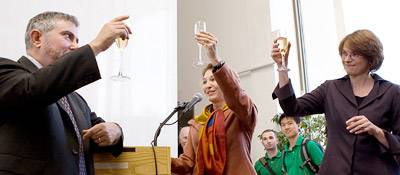
Krugman was toasted by the heads of his two departments at Princeton: Anne-Marie Slaughter (center), dean of the Woodrow Wilson School; and Christina Paxson (right), chair of the economics department.
Krugman was the only winner of this year's Nobel Memorial Prize in Economic Sciences. "By having shown the effects of economies of scale on trade patterns and on the location of economic activity, his ideas have given rise to an extensive reorientation of the research on these issues," the Royal Swedish Academy of Sciences noted in announcing the award today.
In addition to teaching and conducting research at Princeton, Krugman is a well-known columnist for The New York Times and one of the country's foremost liberal commentators on economic, political and policy issues, including the current crisis in the world's financial markets.
Krugman was in Washington, D.C., for a meeting of the Group of 30, an international economics organization, when he received the surprise call notifying him of the Nobel award. "My immediate conclusion was that was an obviously fake Swedish accent," he said.
He attended one session of the Group of 30 meeting, then boarded a train to return to Princeton. "One Nobel Prize can discombobulate your whole day," he said.
Krugman thanked his mentors and colleagues who have contributed to his work over the years, saying, "It is a collegial effort. ... On behalf of international trade people everywhere, I'd like to thank the Nobel committee for recognizing this field. It has been transformed in these past 30 years, and it's good to see that recognized."
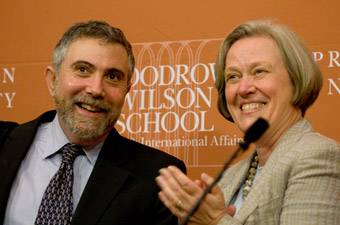
Princeton President Shirley M. Tilghman (right) said she, like many of Krugman's readers of The New York Times, "learned economics by reading that column religiously twice a week."
Princeton President Shirley M. Tilghman, who introduced the press conference, said, "Professor Krugman, I suspect, is less of a stranger to the world than most Nobel laureates in economics because of his role as an op-ed columnist for The New York Times. He has become very much a public intellectual. I believe this prize will be greeted very enthusiastically by many people who have, as I have, learned economics by reading that column religiously twice a week."
Anne-Marie Slaughter, dean of the Wilson School, lauded Krugman for crossing boundaries within his own field and for raising economic awareness in the public sphere. "I know him as someone who has crossed the boundary between Nobel-quality theoretical economics to being a public intellectual who spends a tremendous amount of time educating as wide an audience as he can, bringing all his knowledge to bear -- the knowledge that he helped himself to develop -- to put it in the service of a particular point of view [and] more broadly to put it in the hands of as wide as possible of an audience."
New model of international trade
Krugman's work on international trade and economic geography represents a paradigm shift in research on global economics, noted Christina Paxson, chair of the Department of Economics. "The impact of Paul's research cannot be overstated," she said at the press conference.
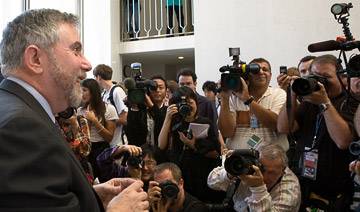
News crews crowded Robertson Hall to get images of Krugman, who said he was stunned by receiving the Nobel Prize. "It's an incredible honor," he said.
"He discarded the notion that firms don't decide where to set up shop, and that people don't make decisions about where to live and work. Instead, he created a unified theory of trade and the location of economic activity, in a world in which firms enjoy economies of scale, consumers demand a richly diverse set of consumer goods and international trade may be limited by transport costs," Paxson explained.
Beginning in 1979, Krugman proposed a new model that provided a theory for the effects of globalization and free trade. It offered a better explanation than the well-established theory of foreign trade that certain countries have a comparative advantage over others in more effectively producing particular goods based on factors such as climate, natural resources, or supplies of labor or capital.
Krugman recognized that the traditional theory did not fully explain modern trends that showed international trade becoming increasingly concentrated among smaller numbers of producers and nations. His work shed light on key economic issues such as why countries import and export the same goods, how companies decide where to locate, how people decide where to live and why dense urban areas become centers of economic activity while existing alongside sparsely populated rural areas.
"When I began working on this, world trade was a lot smaller than it is now, so it certainly is relevant to the changed environment," Krugman said in an interview earlier today. "And I guess you could say I was being global before the world was. I was very concerned in the second part of this work with the location of people and industries within countries, and we certainly are seeing all of these issues about urban growth and regional growth in the U.S. These are issues that don't go away."
Krugman's stature as a rising star in the field was recognized in 1991 when he was awarded the John Bates Clark Medal, which is given by the American Economic Association to the economist under 40 who has made the most important contributions to economics.
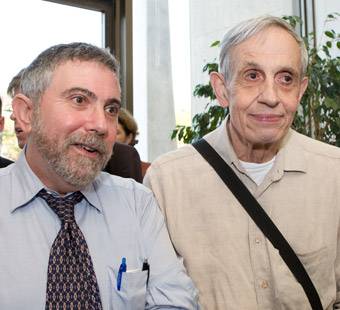
Princeton mathematician John Nash (right), winner of the 1994 Nobel Prize in economics, was among those who joined in the celebration of Krugman's award.
"Paul's contributions on the trade and monetary sides of international economics have revolutionized the way economists think about the global economy," said University of California-Berkeley economist Maurice Obstfeld. "He has a unique ability to convey novel and profound concepts in a deceptively simple way. This simplicity gives him his unmatched ability to describe clearly the essence of very complex economic policy problems.
"The beauty and inspiration of Paul's technical research has always struck me as being quite unique," Obstfeld said. "If there has been a Mozart in my generation of economists, it is Paul Krugman."
"Paul Krugman almost single-handedly changed the course of two centuries of thinking about international trade and economic geography," said Gene Grossman, Princeton's Jacob Viner Professor of International Economics. "Whereas generations of economists thought about differences between countries as the basis for their trade, and about the natural advantages of locations as the basis for agglomeration, Krugman taught us that economies of scale motivates trade between similar countries, and that, in the presence of such economies, accidents of history can explain the growth of cities and regions." For example, Krugman's work has examined how economies of scale helped Rochester, N.Y., home of Eastman Kodak Co., become a hub for the photographic industry.
Addressing his theories on economic geography at the press conference, Krugman said, "What is it about the East Coast of the United States that makes 60 million people want to live in this dense metropolitan strip? The answer is it's not something about the coastline -- each of those 60 million people wants to be here because the other 60 million people are here."
Avinash Dixit, Princeton's John J.F. Sherrerd '52 University Professor of Economics, said Krugman was honored with the Nobel because he "was the undisputed leader in research that modified and extended the traditional theory of international trade."
"That theory was based on the notion of perfect competition among a large number of small sellers and was increasingly seen to be anachronistic in a world where many industries were oligopolistic, with a small number of large firms. Aircraft and autos were the exemplars of this new reality of trade," Dixit said. "Large-scale firms exist because of economies of scale in production; Paul developed ideas about the implications of this for the location of such firms and revolutionized the field of economic geography from a largely descriptive endeavor into an analytical one. It is for these contributions that he has long been regarded as a shoo-in for the Nobel."
Paxson noted that Krugman's seminal 1991 article, "Increasing Returns and Economic Geography" (.pdf), published in the Journal of Political Economy, "is a classic on the reading lists of graduate courses in international trade. His research is also of practical significance, in that it helps us better understand the drivers behind globalization, urbanization and capital movements across countries."

Princeton faculty, students and administrators and members of the media packed Dodds Auditorium in Robertson Hall for a press conference in honor of Krugman's Nobel Prize.
A public presence
In the 1990s, Krugman began to raise his public profile as a columnist for Slate and Forbes magazines, as he attempted to help inform the popular debate on international trade and economic policy. In 2000, he became a twice-weekly columnist for The New York Times, where he has gained attention for his acerbic criticisms of the Bush administration's economic and political philosophies. In addition to his prolific scholarly works, his books include the bestsellers "The Great Unraveling" (2003) and "The Conscience of a Liberal" (2007).
After taking the Times columnist position, Krugman said in 2001 he was determined to "help people get things right," adding that "I often feel there are glaringly obvious things that just aren't being picked up."
"I started taking on some causes, trying to speak to wider audiences," he said. "For example, I was upset that confused notions about international trade were driving public debate on economic policy -- such as the whole competitiveness issue, the commonly used metaphor of international trade as a war with winners and losers."
At Princeton, Krugman reaches a broad range of students. This semester, he is teaching a graduate seminar on "International Monetary Policy and Theory." He has led a variety of classes over the years, including introductory economics courses and freshman seminars.
Asked at the press conference whether he considers himself more of a columnist and commentator or more of an academic, Krugman said, "I still think the university is home -- that's ultimately who I am."
Yet given his notoriety as a Bush critic, many questions sought Krugman's views on the current global financial crisis, to which he responded with biting commentary similar to that found in his columns.
When one reporter asked how Hong Kong should respond to the crisis, Krugman deferred. "My general response to a lot of the emerging market issues I used to write about a lot is ... 'I'm trying to save my own damn republic,'" he said.
Asked what he would do if he was running the country, Krugman cited the move earlier today by the British government to acquire controlling stakes in two of the country's largest banks in exchange for a $64 billion capital infusion as an example of the bold measures needed to stem the crisis. His priorities would be "capital injection into the financial system, temporary guarantees on interfinancial institution lending to get the crisis under control, a large-scale fiscal stimulus program aiding state and local governments' infrastructure spending to get us out of this recession," Krugman said. "And then, after all that, universal health care."
On whether deregulation is to blame for the crisis and whether individuals would be held legally accountable, he said, "It's a fact that, as the system outgrew the old regulations, the regulations were not expanded to take account of the system. There is a lot of grotesque greed underneath this crisis, but greed isn't illegal, and since there were, for the most part, no regulations I don't think there can be very much [done]. ... We might see some of the bums in jail or at least in stocks in the public square, but I don't think it's going to happen."
Looking back on the meltdown in the housing market that led to the current turmoil, Krugman said even he should have identified more of the warning signs. "I had all the stuff in my intellectual toolkit to have seen this coming. I saw parts of it; I saw the housing bubble, but why didn't I understand that the same kinds of balance sheet constraints, the same kind of vicious circles that took place in Indonesia in 1997 or in Argentina in 2002, could happen here once the housing bubble burst?"
The message to Americans, then, is that "I think everybody needs to understand that the world has dangers in it, that there are monsters that you may have thought were invisible and they turn out to be entirely real," he said.
Krugman's Nobel award came five days after former Princeton researcher Osamu Shimomura was named a winner of the 2008 Nobel Prize in chemistry for a discovery he made while working at University. It also is the second year in a row that the Nobel economics prize has a Princeton connection. One of the 2007 winners, Eric Maskin, has been a visiting lecturer with the rank of professor in economics at Princeton since 2002 and is a professor at the neighboring Institute for Advanced Study.
This is the second Nobel Prize in economics in the past six years for a Princeton scholar affiliated with the Woodrow Wilson School. Daniel Kahneman, a professor of psychology and public affairs, received the award in 2002.
Overall, Krugman is the eighth Princeton faculty, staff member or alumnus to be awarded a Nobel in economics. He will receive the award, which is officially known as the Sveriges Riksbank Prize in Economic Sciences in Memory of Alfred Nobel, on Dec. 10 at the Stockholm Concert Hall. On Dec. 8, he will present a lecture at Stockholm University.

